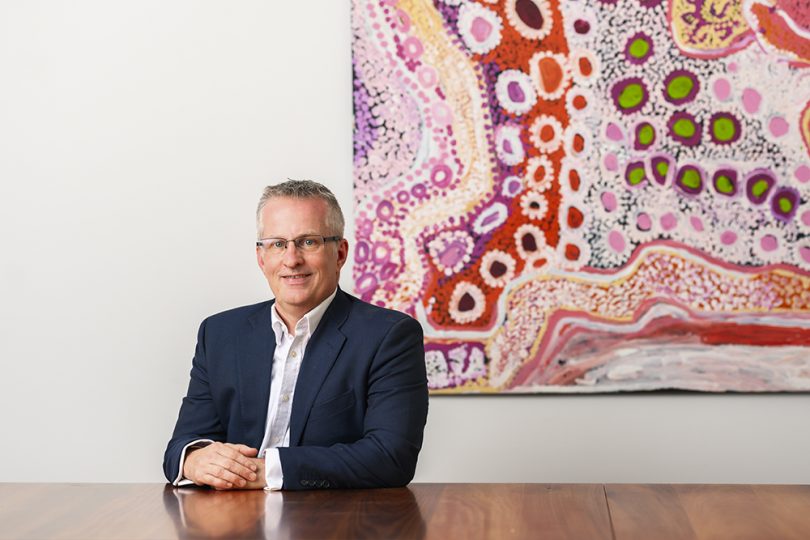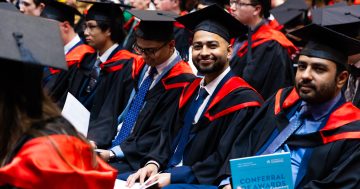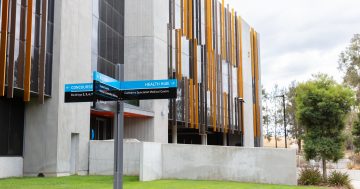
University of Canberra vice-chancellor Paddy Nixon. Photo: Rohan Thomson.
The University of Canberra (UC) has jumped nine places to 184th in the Times Higher Education World University Rankings for 2021, maintaining its position in the top 10 universities in Australia behind the second-placed Australian National University (59th overall) and the top-ranked University of Melbourne.
Australian National University slipped from 50th in the world and was ranked third out of the Australian institutions, behind the University of Melbourne and the University of Sydney.
For the fifth year in a row, the University of Oxford has held onto first place, ahead of Standford and Harvard, which both rose into the top three. The California Institute of Technology dropped two places to fourth, while Yale, University of Cambridge and University of Chicago appear in the top ten.
Mainland China now provides both of Asia’s top two universities, with Tsinghua and Peking universities ranking 23rd and 24th respectively. China’s universities have continued to expand their influence and presence on the world stage.
UC vice-chancellor Professor Paddy Nixon told Region Media that being among the world’s top 200 universities puts the University of Canberra among the world’s top one per cent.
“The world’s leading universities are there because they are research powerhouses,” Professor Nixon said.
“We’ve taken a different approach by having a small number of research areas where we build our concentration in those areas, such as government policy, allied health, biosciences, sport, robotics and education.
“What I’m really proud of is that we are 30 years old and already recognised as one of the strongest universities in the world.”
The Times Higher Education World University Rankings includes almost 1400 universities across 92 countries and produces the largest and most diverse university rankings.
Since entering the rankings in 2016 and placing in the top 501-600 band, UC has continued to rocket up the ranks. UC has just under 11,000 students with an international student ratio of 32 per cent.
The rankings are based on 13 calibrated performance indicators that measure an institution’s performance across teaching, research, citations, industry income and international outlook.
Professor Nixon said that over the last decade, UC has invested in its research capacity and student experience, while dealing with no new international students enrolments next year.
“The university has had a very sensible strategy in terms of growing international student numbers but doing that at a steady and controlled pace,” he said.
“We are of course facing the perfect storm at the moment with COVID and having no international students next year, which is a significant issue for all universities.”
Professor Nixon also pointed to Federal Education Minister Dan Tehan’s reforms which were passed by the House of Representatives on Tuesday (1 September) and will now be debated in the Senate.
“The reforms are for a reduction of government funding after the next two or three years, which is fundamental to how we operate as a university,” Professor Nixon said. “This will obviously have a flow-on effect on how universities in Australia are ranked.”
But he added that world rankings do not define the university’s success.
“Rather, they are a wonderful barometer for the way we are tracking internationally. This success is driven by each and every one of our dedicated staff who continue to show resilience, agility and innovation, particularly during this difficult year.
“Our dedication to both research and teaching, ensuring that our best researchers pass on that knowledge directly to our students, but also contribute to our local community is part of our continued success,” Professor Nixon said.
Universities Australia, the peak body representing Australia’s 39 universities, has argued that immediate relief is needed to support Australia’s university research capacity. It’s also lobbied for hardship funding to compensate for the lack of fees from international students.
Universities Australia’s chief executive Catriona Jackson said independent estimates show that $3.3 billion – around 27 per cent – of university research and development budgets are at risk.
“Private sector investment is expected to decline sharply, making the role universities have played keeping Australia’s R&D effort alive ever more important.
“Every researcher lost to the system is one person fewer working on Australia’s most important problems and represents the loss of years of human and intellectual capital,” Ms Jackson said.




















